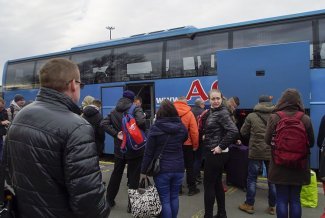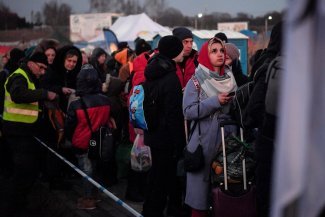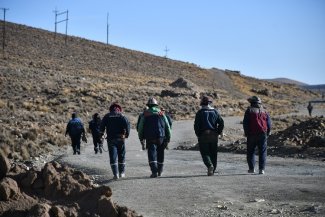
Ukrainian women escaping the Russian invasion of their country wait for a bus after crossing the Ukrainian-Polish border crossing at Medyka, south-eastern Poland, on 8 April 2022.
“Tell them your story. If you are asked about your weaknesses, put them in a positive light. Don’t be afraid to ask questions!” During a webinar organised for Ukrainian refugees by Mamo pracuj (Mum, work!), a Kraków -based NGO supporting mums returning to the labour market, a dozen or so women are learning the basics of job interviews. When the Q&A session starts, attendees enquire about the recognition of Ukrainian educational qualifications in Poland, accessing job vacancies and salary expectations.
The founders of Mamo pracuj launched a program specifically for Ukrainian women seeking jobs in Poland shortly after the outbreak of the war in February. “We were all horrified. I saw women with children arriving at the railway station and we wanted to do for them what we already do best for Polish women, which is to help them find their competencies [in the job market,]” recalls Marcelina Palka, a project coordinator for Mamo pracuj.
Thanks to over 100 expert volunteers – such as recruiters, HR managers and career coaches – some 500 Ukrainian refugees are being helped to find decent work in Poland. Mamo pracuj’s ambition is to provide Ukrainian women with multi-faceted support, from legal advice to psychosocial assistance. But the organisation is just one of many public and private initiatives that have sprung up to support the integration of Ukrainian refugees in Poland since the Russian invasion began on 24 February 2022.
Thanks to their geographical proximity and cultural similarities, for almost a decade (and particularly since the beginning of the Russian-Ukrainian war in Donbas in 2014), Ukrainians have comprised the largest group of foreign workers in Poland. Although accurate data is hard to come by, according to various sources, between 1.5 and 2 million Ukrainian migrants were already in Poland before the war, mostly performing low-paid jobs in industrialised sectors such as construction, transport and agriculture. But there has been a massive demographic shift.
Approximately 150,000 Ukrainian workers, the majority of whom were men, have left Poland since February to join the war effort, while Poland’s government has granted all Ukrainians fleeing the war temporary right of residence and full access to the labour market.
Although they are commonly referred to as such, most Ukrainians in Poland are not officially refugees. They have been granted temporary special status, with very few applying for asylum as most Ukrainians plan to return home at some point, if they haven’t already done so. According to the latest [September] figures from the Ministry of Digital Affairs, an estimated 1.346 million people from Ukraine have applied for a Polish Identification Number (PESEL); this provides them with the same benefits as Polish citizens, including access to health care, free public education, and monthly child benefits. The vast majority of these people are women and children, as Ukrainian men between the ages of 18 and 60 are banned from leaving the country, but this has led to significant labour market mismatches.
“Ukrainian refugees are mostly women so obviously some of the job offers will not be suitable for them because they concern typically male professions like transport or construction. The [Polish] labour market badly needs those Ukrainians who returned home to join the fight. Whole sectors like construction depended on Ukrainian migrants,” said analyst Zbigniew Gajewski from THINKTANK Poland during a discussion panel organised by the German foundation Friedrich Ebert Stiftung (FES) on the impact Ukrainian refugees on Polish labour market earlier this year.
Displaced women: a double disadvantage
Although the Russian invasion has forced a large percentage of educated and high-skilled workers into exile, displaced women generally face a double disadvantage, for being women and for being migrants. “This crisis made people who were very well-integrated and respected in their communities leave to save their lives. Now they are competition to Poland’s low paid workers. It is extremely difficult to find a position where their qualifications could be used,” says Dr. Olena Davlikanova from FES Ukraine, herself a refugee who fled to Poland.
The most frequent concerns of these often-traumatised women are access to housing and childcare, finding decent work and navigating the Polish language. “The language barrier is a huge challenge,” Palka of Mamo pracuj tells Equal Times. “If a woman speaks Polish or English, we know that there are much greater chances that she will find a job. If we have a lady who only speaks Ukrainian or Russian, going through the recruitment process becomes a big problem.”
According to various reports in the Polish media, by late August some 420,000 Ukrainians had found employment in Poland thanks to simplified procedures. Ukrainian migrants do not need to apply for a work permit; instead, an employer has 14 days to report that they are employing a Ukrainian citizen.
According to a source at the Employers of Poland lobby group, most Ukrainian refugees – some 70 per cent – that have been hired in Poland are women, with half of them engaged in low-paid work in manufacturing, services, or agriculture.
However, the number of refugees that are actually employed in Poland may vary substantially from the official statistics as data presented by the authorities refer only to the Ukrainians who have taken legal employment. In practice, due to language barriers and childcare issues, many refugees work off the books in the informal economy.
Trade unions and business groups both agree that opening up the labour market was a positive step towards the integration of Ukrainian workers into Polish society, especially given the pressures facing NGOs and local governments responding to the influxof Ukrainians seeking refuge. “Poland is still a relatively poor country. It is very difficult to provide accommodation and aid [for the large number of refugees]. How long we can hold on remains an open question,” says Sebastian Koćwin, vice chair of the Polish trade union confederation, OPZZ (the All Poland Alliance of Trade Unions).
Although trade unions and labour inspectors say they are vigilant to the potential exploitation of Ukrainian refugees in Poland, so far, very little has been reported through official channels. Poland’s chief labour inspectorate informed Equal Times that they had no known records of labour abuses of Ukrainian refugees working in Poland, but Koćwin of OPZZ says that while the unions are aware of many violations, few workers come forward to file a complaint. In one example, a Ukrainian refugee was hired to work in hospitality via a temporary agency and was forced to work from 5am until 11 pm while her three children stayed in a hostel without adult supervision. “Even before the outbreak of the war we had issues with illegal employment and even cases of forced labour. Now given the scale of the crisis, we have a lot of concerns,” says Koćwin.
‘Junk’ contracts and protecting domestic workers
One very common feature to the work offered to Ukrainian refugees are freelance contracts, known colloquially as ‘junk contracts’. Koćwin puts the number of legally employed refugees on such contracts at 70 per cent. While it is the case that many Ukrainians want to return home when the conflict is over, freelance contracts are based on the civil law instead of the labour code. These contracts may be subject to minimum wage regulations and social security taxes, but there is no limit on working hours nor are workers entitled to the same benefits as employees, like sick pay or holidays.
“I would like to have an employment contract but then I would earn less than what I earn now. To earn more, I must work more,” says Natalia Matsiuk who has been employed for four and a half years by a temping agency to work in one of Poland’s largest discount chain stores. Her story illustrates some of the difficulties facing Ukrainian women in Poland and how the war has changed the lives of Ukrainian migrants. For example, Natalia works 10 hours a day, six days a week as a cashier to support herself and her two teenage daughters, who she previously entrusted into the care of her parents, and whom she supported with remittances. However, since the war broke out and her daughters escaped to Poland, their standard of living has declined due to the higher cost of living in Poland, rising housing costs and surging inflation eating into her wages.
The authors of a 2021 report, The Impact of Covid-19 on Ukrainian Women Migrants in Poland, found that even before the war, those most impacted by precarious work are women who take up domestic care jobs. It is a sector characterised by informality which leaves workers without adequate labour protections. But it is a rapidly expanding area, especially with Poland’s ageing population. A quick glance at social networks addressed to Ukrainian refugees shows a flood of black market offers of work.
Thousands of Poles opened their homes to Ukrainians seeking refuge, but activists are sounding the alarm over the possible exploitation of Ukrainians working in the domestic care sector.
“There is no regulation concerning time of work or tasks to be carried out. Many women are hired to care for the elderly, but they are also required to clean, cook, give medicines or even injections. Our right to rest or time off is not respected,” says Ruslana Poberezhnyk, from the Domestic Workers Committee.
“Employers often expect domestic workers to be available 24 hours, seven days a week. The money we get cash in hand is little more than a minimum wage, but the majority are hired without any contracts at all,” she says. Poberezhnyk, who originally comes from Ivano-Frankivsk in western Ukraine, has been working as a nanny for two decades. Although she says she has had good experiences with Polish families, she has also spent many years assisting Ukrainian migrants who have been exploited. “I was getting fellow workers out of trouble when their employers didn’t want to pay or took away their passports,” she says.
Poberezhnyk and her colleagues started a union in September 2021 to fight for recognition and the rights of domestic care workers. The union, which is affiliated to the grassroots confederation Inicjatywa Pracownicza (Workers’ Initiative, or OZZ IP) meet every Sunday in downtown Warsaw. As well as providing support for domestic workers, the union has been lobbying the Polish government to legalise their work and guarantee decent pay and working conditions.
“We invite refugees to join our meetings during which we explain how not to fall prey to exploitation or avoid working for minimum wages and accommodation. We make them aware of their rights because we know that they can earn their living legally,” Poberezhnyk asserts.












